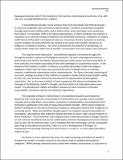The mahatma in the machine
Author(s)
Banerjee, Dwaipayan
DownloadCSA - Review of Unconditional Equality - Dwaipayan Banerjee - FINAL AUTHOR COPY.pdf (74.49Kb)
OPEN_ACCESS_POLICY
Open Access Policy
Creative Commons Attribution-Noncommercial-Share Alike
Terms of use
Metadata
Show full item recordAbstract
n Unconditional equality, Skaria achieves that most improbable and difficult of goals – to write with originality and inventiveness about Gandhi. Gandhian scholarship has passed through several well-trodden paths, and as Skaria tracks, some have been more productive than others. For example, there is the liberal appropriation, in which Gandhian non-violence is translated as an internal critique of imperfect but perfectible institutions, coupled to an implicit reaffirmation of the state’s monopoly of violence. In contrast, Skaria’s work joins an exciting counter-tradition of scholarship that has refused to shy away from Gandhi’s insistence on religion as a condition of politics. Yet, even as Skaria joins this tradition of scholarship, he travels further down the rabbit hole of Gandhi’s conservatism than most others have ventured. Keywords: Gandhi; machine; political theology; ethics; non-violence
Date issued
2018-01Department
Massachusetts Institute of Technology. Program in Science, Technology and SocietyJournal
Contemporary South Asia
Publisher
Taylor & Francis
Citation
Banerjee, Dwaipayan. “The Mahatma in the Machine.” Contemporary South Asia 25, 4 (October 2, 2017): 435–438
Version: Author's final manuscript
ISSN
0958-4935
1469-364X